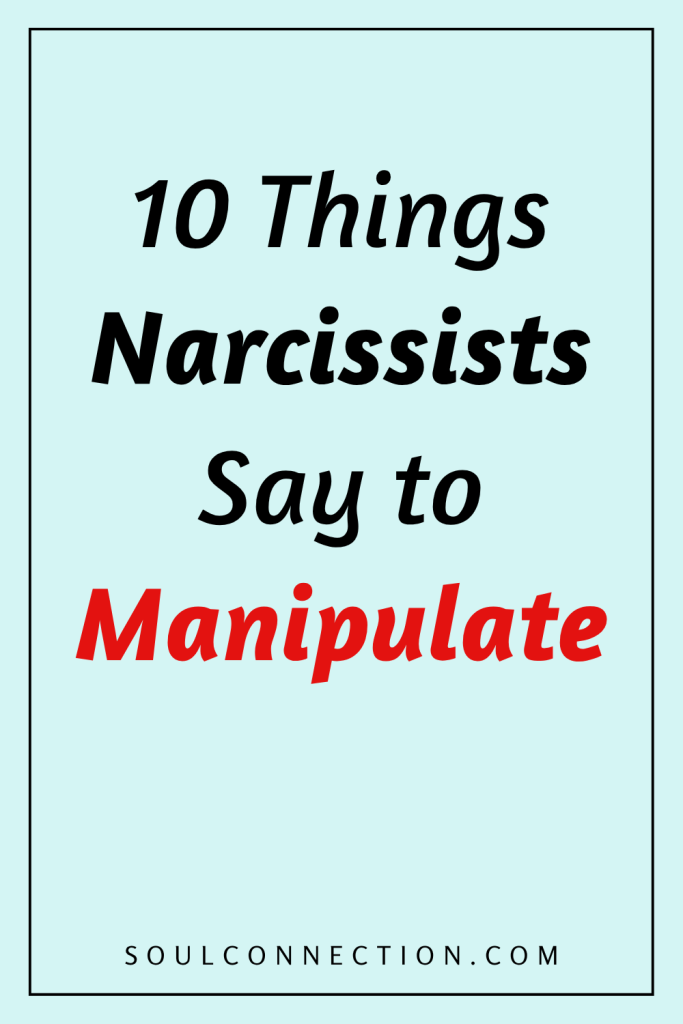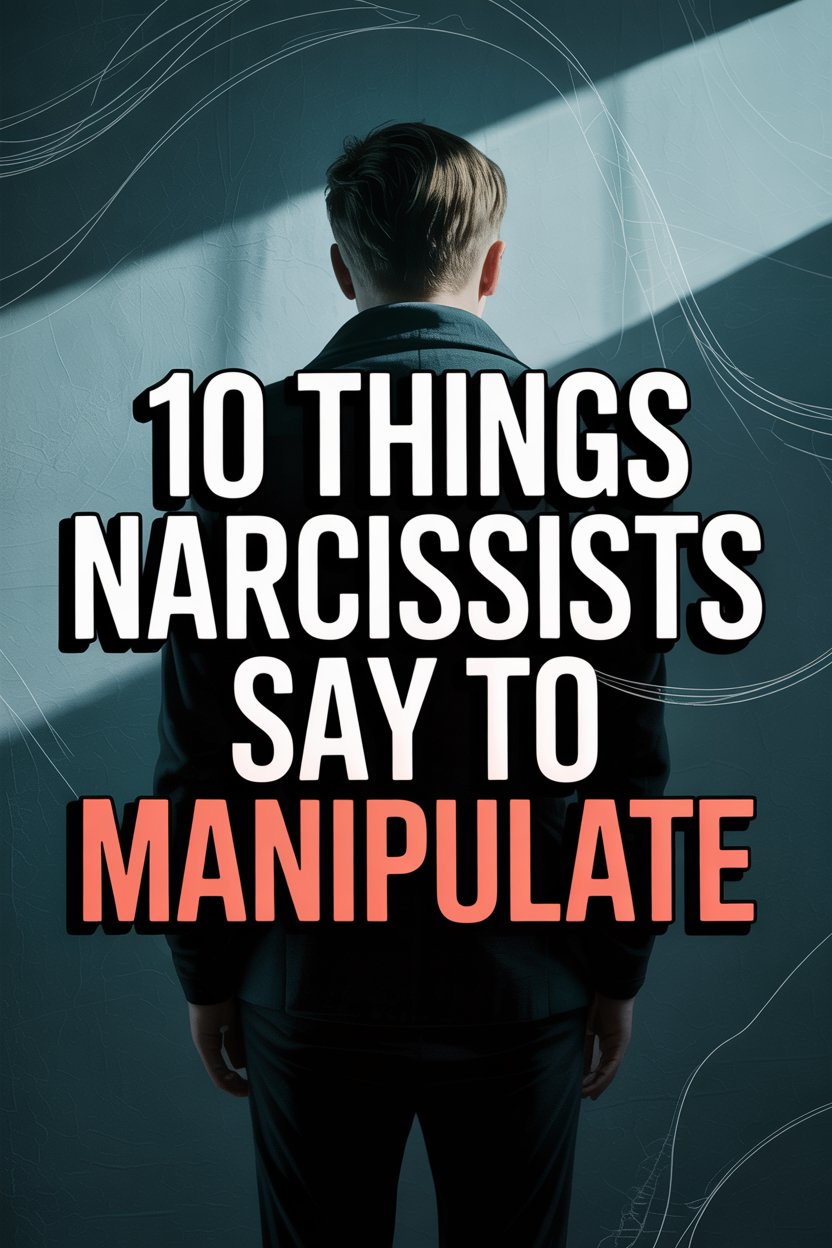Ever had a conversation with someone that left you wondering if you’d wandered into a hall of mirrors, only to realize it was just another chat with a narcissist? Welcome to the funhouse.
Narcissists aren’t just garden-variety difficult—they’re Olympic-level manipulators, armed with a grab-bag of phrases designed to leave you questioning everything from your feelings to your grip on reality.
Here’s a closer look at ten classic lines narcissists toss out, why they work, and a few strategies that’ll help you keep your sanity next time you hear them.
1. You’re Too Sensitive
If narcissists had a dollar for every time they used this old chestnut, they’d be running their own banks by now. Accusing someone of being “too sensitive” is the conversational equivalent of waving a red flag while tap-dancing on your last nerve.
The trick here? It shifts blame for their hurtful words or actions squarely onto your emotional state. Suddenly, the problem isn’t what was said or done—it’s how you reacted.
It’s a genius move if you’re aiming to dodge accountability and make someone else feel like the unreasonable one.
What helps: When this phrase pops up, take a breath. Remind yourself that your feelings are valid—even if they make someone else uncomfortable.
Keeping a mental note or even jotting down what happened can help you spot patterns (and dodge future emotional gaslighting).
2. I Never Said That
Welcome to the world of gaslighting, where reality is a choose-your-own-adventure and the narcissist is both author and unreliable narrator. “I never said that” is a classic maneuver, turning your memory into public enemy number one.
Suddenly, you’re replaying conversations in your mind, combing through texts, wondering if you’ve actually lost the plot. It’s not about the truth—it’s about making you doubt your own recollections.
What helps: Keep receipts. When you’re dealing with a chronic reality-bender, written communication is your best friend. Stick to texts, emails, or notes when something important comes up, and resist the urge to argue when they start rewriting history.
3. You’re Just Being Paranoid
Got a hunch something’s off? Prepare to be told you’re imagining things. Narcissists thrive when you second-guess yourself, and “paranoid” is a handy label to slap on anyone who starts asking tricky questions.
It’s a clever way to brush off legitimate concerns—while making you feel foolish for even bringing them up.
What helps: When the P-word gets tossed your way, ask for specifics. “Can you help me understand why you think that?” Watch for vagueness, deflection, or the emotional equivalent of a smoke bomb.
4. If You Loved Me, You Would…
Nothing like conditional affection to add a little spice to a relationship. “If you loved me, you would…” can end in almost anything: lend money, keep secrets, walk on eggshells, you name it.
Suddenly, love becomes a bargaining chip, handed over only if you jump through enough hoops. This phrase is all about shifting power and keeping you off balance, one demand at a time.
What helps: Spot the manipulation for what it is. Love isn’t a test with a high-stakes final exam. When emotional blackmail shows up, it’s time to question whose needs are really being prioritized.
5. Everyone Else Agrees With Me
The narcissist’s imaginary fan club is always ready with a standing ovation. “Everyone else agrees with me” is designed to make you feel isolated and outnumbered—after all, if everyone else sees it their way, maybe you’re the problem.
Reality check: everyone else rarely exists. Or if they do, they’ve probably only heard one side of the story, passed through a filter as foggy as a London morning.
What helps: Ask for specifics. Who exactly is “everyone”? If you get vague answers, congratulations—you’ve just caught the narcissist borrowing imaginary backup. Trust your own assessment, not a phantom peanut gallery.
6. You’re Overreacting
Here’s another classic: the emotional buzzkill. By telling you you’re making a mountain out of a molehill, the narcissist sidesteps responsibility and makes you second-guess whether your reaction is “appropriate” (bonus points for making you feel foolish).
The end goal is always the same—keep you quiet, keep things status quo, and keep uncomfortable feelings nicely bottled up.
What helps: Pause before shrinking yourself. Would someone else in your shoes react the same way? If the answer is yes, hang onto your perspective. If not, it’s still okay to feel how you feel.
7. I Guess I’m Just a Terrible Person
Say hello to the self-pity spiral: when all else fails, narcissists love to play the martyr. The idea isn’t to admit fault—it’s to guilt-trip you into apologizing or reassuring them, even when they’re the one at fault.
This phrase is a manipulator’s two-for-one. It derails the original discussion, and suddenly you’re comforting the very person who hurt you.
What helps: Resist the urge to rush in with reassurances. Stick to the original topic, and gently bring the focus back. “That’s not what I’m saying. I’d just like to talk about what happened.”
8. You’re Lucky to Have Me
Confidence is one thing, but narcissistic arrogance is next-level. “You’re lucky to have me” isn’t just a brag—it’s a tool to keep you feeling insecure, like you’re always one misstep away from being replaced by someone more “worthy.”
It’s a subtle way to remind you not to question, challenge, or expect more—because who else would put up with you, anyway?
What helps: Flip the script. Relationships are partnerships, not prizes. Take stock of what you bring to the table, and remember you deserve genuine appreciation, not crumbs of conditional praise.
9. I’m Sorry You Feel That Way
This is the non-apology apology—offering as much comfort as a wet blanket on a cold day. The narcissist isn’t sorry for what they did; they’re sorry you’re upset. Notice the difference? It’s about sidestepping accountability while pretending to care.
It’s a masterstroke in keeping things superficial and moving swiftly away from any meaningful change.
What helps: When you hear this, look for real accountability. An actual apology takes responsibility (“I’m sorry I hurt you,” not “I’m sorry you’re so sensitive”). If you’re only getting the former, you know where you stand.
10. I Don’t Have Time for This
When all else fails, some narcissists pull the escape hatch. “I don’t have time for this” is a handy way to shut down uncomfortable conversations, dodge responsibility, or just avoid any emotional labor whatsoever.
Suddenly, your need for clarity and resolution is an inconvenience. The conversation ends, and you’re left holding the emotional bag.
What helps: Don’t chase after resolution when someone has clearly checked out. Give yourself permission to step back. If conversations always end this way, consider how much of yourself you want to keep investing.
Breaking the Cycle
It doesn’t take a degree in psychology to spot these lines once you know what to listen for. Narcissists use them to dodge responsibility, twist your words, and keep you walking on eggshells.
Here’s the thing: recognizing these phrases is the first step in untangling yourself from their web. The more you name the manipulation, the less power it has over you.
No magic formula required—just a healthy dose of skepticism, some well-timed boundaries, and the reminder that your feelings are allowed to take up space.
Relationships don’t have to feel like a chess match where the rules always change. You don’t need to win every conversation, but you do deserve honesty, respect, and the freedom to trust your own reality.
Keep your wits about you, and next time you hear one of these classics, remember—the only thing you’re “too much” of is aware.


